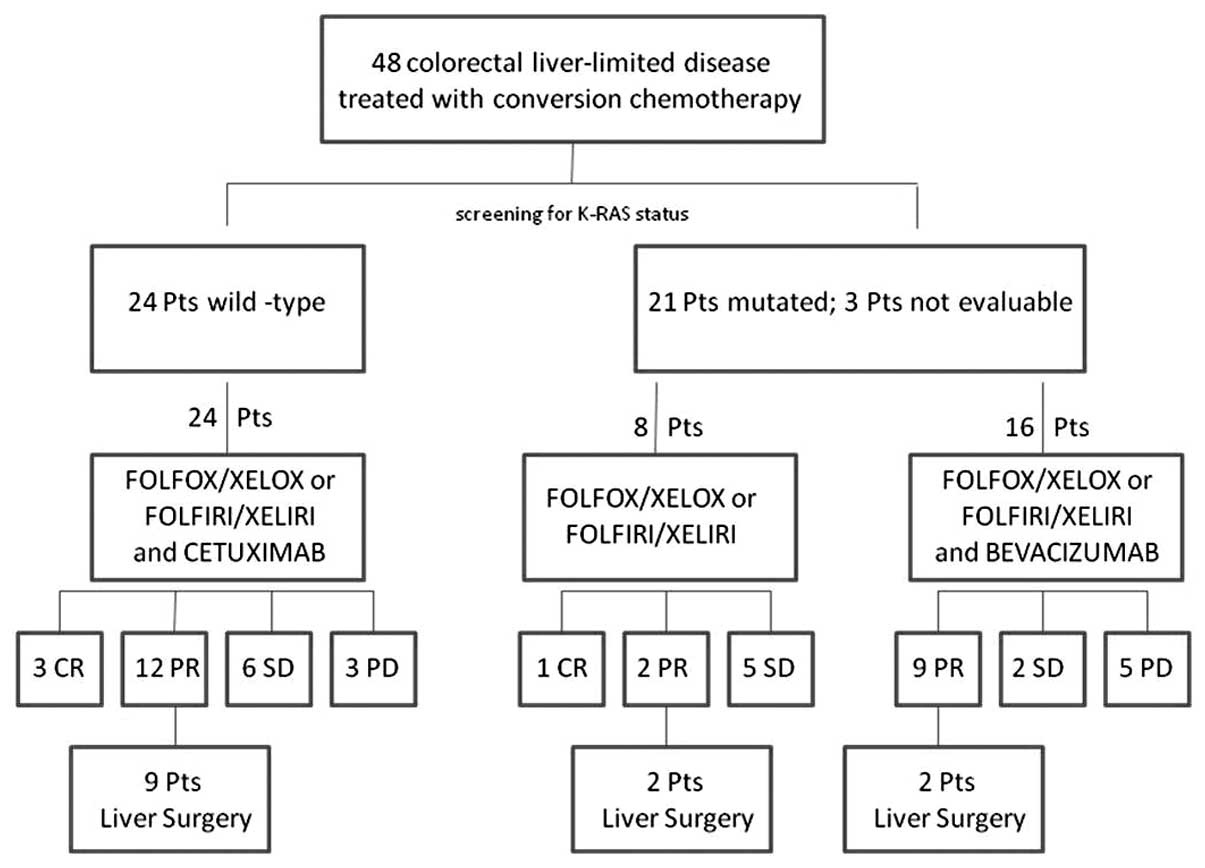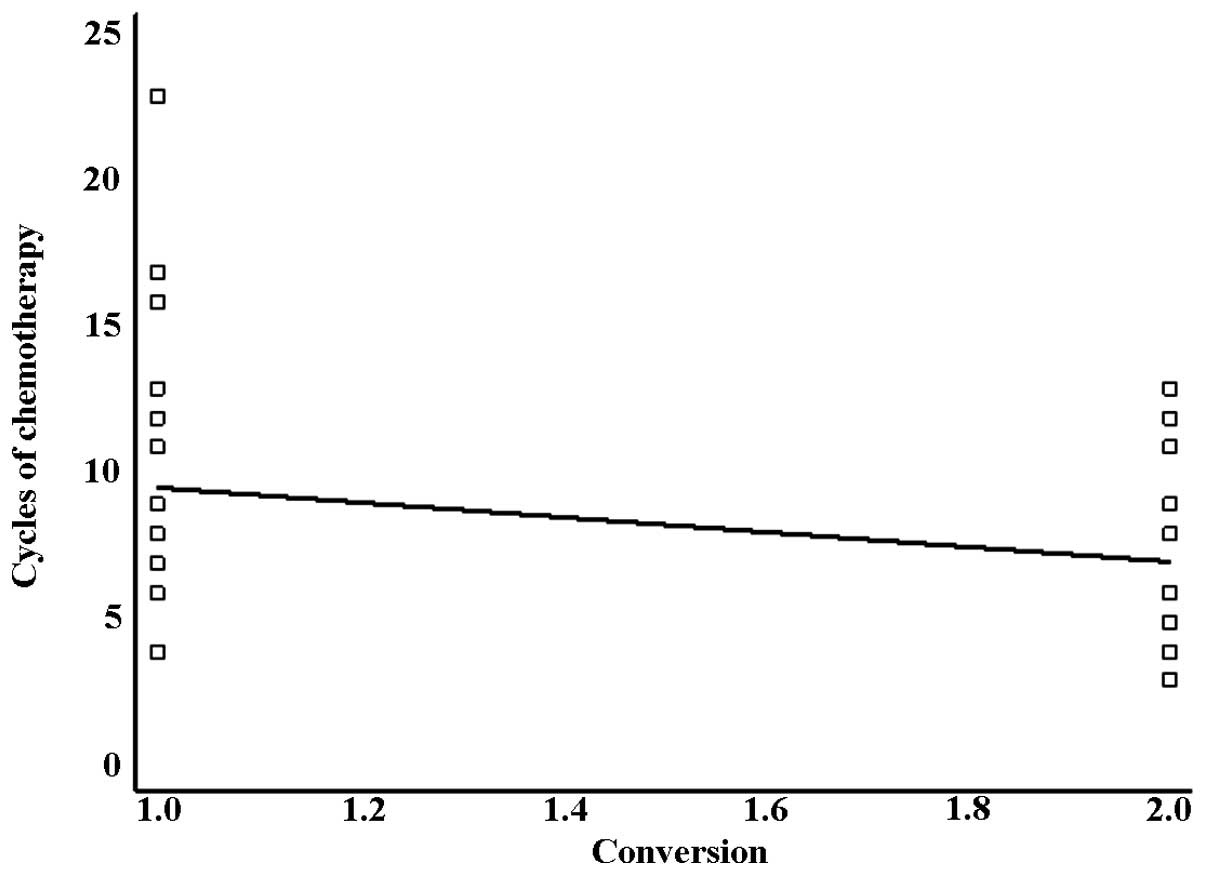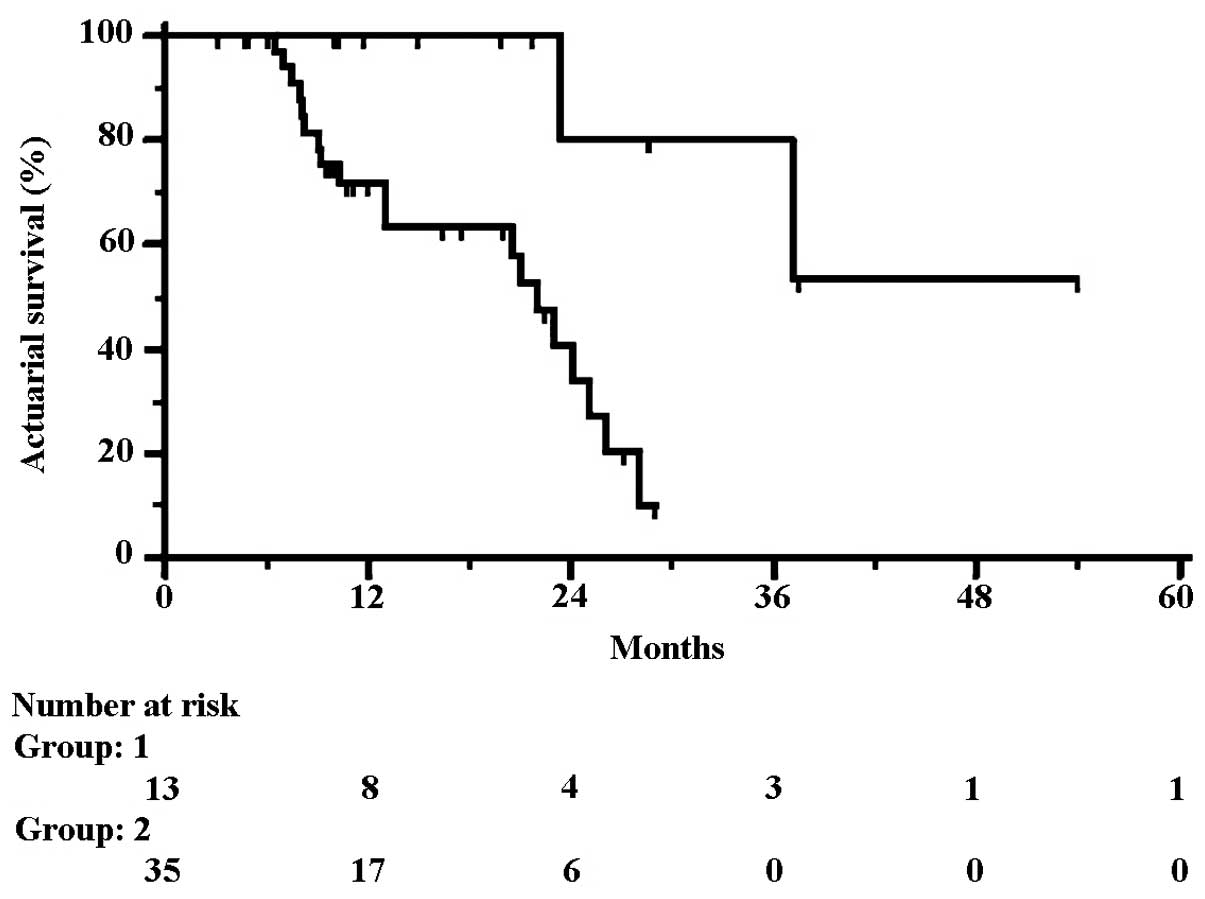|
1
|
Poston GJ, Adam R, Alberts S, et al:
OncoSurge: a strategy for improving resectability with curative
intent in metastatic colorectal cancer. J Clin Oncol. 23:7125–7134.
2005. View Article : Google Scholar : PubMed/NCBI
|
|
2
|
Manfredi S, Lepage C, Hatem C, Coatmeur O,
Faivre J and Bouvier AM: Epidemiology and management of liver
metastases from colorectal cancer. Ann Surg. 244:254–259. 2006.
View Article : Google Scholar : PubMed/NCBI
|
|
3
|
Sundermeyer ML, Meropol NJ, Rogatko A,
Wang H and Cohen SJ: Changing patterns of bone and brain metastases
in patients with colorectal cancer. Clin Colorectal Cancer.
5:108–113. 2005. View Article : Google Scholar : PubMed/NCBI
|
|
4
|
Nordlinger B, Van Cutsem E, Rougier P, et
al: Does chemotherapy prior to liver resection increase the
potential for cure in patients with metastatic colorectal cancer? A
report from the European Colorectal Metastases Treatment Group. Eur
J Cancer. 43:2037–2045. 2007. View Article : Google Scholar
|
|
5
|
Cook AD, Single R and McCahill LE:
Surgical resection of primary tumors in patients who present with
stage IV colorectal cancer: an analysis of surveillance,
epidemiology, and end results data, 1988 to 2000. Ann Surg Oncol.
12:637–645. 2005. View Article : Google Scholar : PubMed/NCBI
|
|
6
|
Nordlinger B, Vauthey JN, Poston G,
Benoist S, Rougier P and Van Cutsem E: The timing of chemotherapy
and surgery for the treatment of colorectal liver metastases. Clin
Colorectal Cancer. 9:212–218. 2010. View Article : Google Scholar
|
|
7
|
Tournigand C, André T, Achille E, et al:
FOLFIRI followed by FOLFOX6 or the reverse sequence in advanced
colorectal cancer: a randomized GERCOR study. J Clin Oncol.
22:229–237. 2004. View Article : Google Scholar : PubMed/NCBI
|
|
8
|
Geva R, Prenen H, Topal B, Aerts R,
Vannoote J and Van Cutsem E: Biologic modulation of chemotherapy in
patients with hepatic colorectal metastases: the role of anti-VEGF
and anti-EGFR antibodies. J Surg Oncol. 102:937–945. 2010.
View Article : Google Scholar : PubMed/NCBI
|
|
9
|
Galizia G, Lieto E, Orditura M, et al:
First line chemotherapy vs bowel tumor resection plus chemotherapy
for patients with unresectable synchronous colorectal hepatic
metastases. Arch Surg. 143:352–358. 2008. View Article : Google Scholar : PubMed/NCBI
|
|
10
|
Galizia G, Castellano P, Pinto M, et al:
Radiofrequency-assisted liver resection with a comb-shaped bipolar
device versus clamp crushing: a clinical study. Surg Innov.
19:407–414. 2012. View Article : Google Scholar : PubMed/NCBI
|
|
11
|
Grothey A, Sargent D, Goldberg RM and
Schmoll HJ: Survival of patients with advanced colorectal cancer
improves with the availability of fluorouracil-leucovorin,
irinotecan, and oxaliplatin in the course of treatment. J Clin
Oncol. 22:1209–1214. 2004. View Article : Google Scholar : PubMed/NCBI
|
|
12
|
Van Cutsem E, Rivera F, Berry S, et al:
Safety and efficacy of first-line bevacizumab with FOLFOX, XELOX,
FOLFIRI and fluoropyrimidines in metastatic colorectal cancer: the
BEAT study. Ann Oncol. 20:1842–1847. 2009.PubMed/NCBI
|
|
13
|
Van Cutsem E, Köhne CH, Láng I, et al:
Cetuximab plus irinotecan, fluorouracil, and leucovorin as
first-line treatment for metastatic colorectal cancer: updated
analysis of overall survival according to tumor KRAS and
BRAF mutation status. J Clin Oncol. 29:2011–2019.
2011.PubMed/NCBI
|
|
14
|
Bokemeyer C, Bondarenko I, Hartmann JT, et
al: Efficacy according to biomarker status of cetuximab plus
FOLFOX-4 as first-line treatment for metastatic colorectal cancer:
the OPUS study. Ann Oncol. 22:1535–1546. 2011. View Article : Google Scholar : PubMed/NCBI
|
|
15
|
Douillard JY, Siena S, Cassidy J, et al:
Randomized, phase III trial of panitumumab with infusional
fluorouracil, leucovorin, and oxaliplatin (FOLFOX4) versus FOLFOX4
alone as first-line treatment in patients with previously untreated
metastatic colorectal cancer: the PRIME study. J Clin Oncol.
28:4697–4705. 2010. View Article : Google Scholar
|
|
16
|
Mitry E, Fields AL, Bleiberg H, et al:
Adjuvant chemotherapy after potentially curative resection of
metastases from colorectal cancer: a pooled analysis of two
randomized trials. J Clin Oncol. 26:4906–4911. 2008. View Article : Google Scholar : PubMed/NCBI
|
|
17
|
Nordlinger B, Sorbye H, Glimelius B, et
al: Perioperative chemotherapy with FOLFOX4 and surgery versus
surgery alone for resectable liver metastases from colorectal
cancer (EORTC Intergroup trial 40983): a randomised controlled
trial. Lancet. 371:1007–1016. 2008. View Article : Google Scholar
|
|
18
|
Folprecht G, Grothey A, Alberts S, Raab HR
and Köhne CH: Neoadjuvant treatment of unresectable colorectal
liver metastases: correlation between tumour response and resection
rates. Ann Oncol. 16:1311–1319. 2005. View Article : Google Scholar
|
|
19
|
Masi G, Vasile E, Loupakis F, et al:
Randomized trial of two induction chemotherapy regimens in
metastatic colorectal cancer: an updated analysis. J Natl Cancer
Inst. 103:21–30. 2011. View Article : Google Scholar : PubMed/NCBI
|
|
20
|
Folprecht G, Gruenberger T, Bechstein WO,
et al: Tumour response and secondary resectability of colorectal
liver metastases following neoadjuvant chemotherapy with cetuximab:
the CELIM randomised phase 2 trial. Lancet Oncol. 11:38–47. 2010.
View Article : Google Scholar
|
|
21
|
Klinger M, Tamandl D, Eipeldauer S, et al:
Bevacizumab improves pathological response of colorectal cancer
liver metastases treated with XELOX/FOLFOX. Ann Surg Oncol.
17:2059–2065. 2010. View Article : Google Scholar : PubMed/NCBI
|
|
22
|
Masi G, Loupakis F, Salvatore L, et al:
Bevacizumab with FOLFOXIRI (irinotecan, oxaliplatin, fluorouracil,
and folinate) as first-line treatment for metastatic colorectal
cancer: a phase 2 trial. Lancet Oncol. 11:845–852. 2010. View Article : Google Scholar
|
|
23
|
Wong R, Cunningham D, Barbachano Y, et al:
A multicentre study of capecitabine, oxaliplatin plus bevacizumab
as perioperative treatment of patients with poor-risk colorectal
liver-only metastases not selected for upfront resection. Ann
Oncol. 22:2042–2048. 2011. View Article : Google Scholar
|
|
24
|
Bertolini F, Malavasi N, Scarabelli L, et
al: FOLFOX6 and bevacizumab in non-optimally resectable liver
metastases from colorectal cancer. Br J Cancer. 104:1079–1084.
2011. View Article : Google Scholar : PubMed/NCBI
|
|
25
|
Adam R, Wicherts DA, de Haas RJ, et al:
Complete pathologic response after preoperative chemotherapy for
colorectal liver metastases: myth or reality? J Clin Oncol.
26:1635–1641. 2008. View Article : Google Scholar : PubMed/NCBI
|
|
26
|
Goèré D, Gaujoux S, Deschamp F, et al:
Patients operated on for initially unresectable colorectal liver
metastases with missing metastases experience a favorable long-term
outcome. Ann Surg. 254:114–118. 2011.
|
|
27
|
Cleary JM, Tanabe KT, Lauwers GY and Zhu
AX: Hepatic toxicities associated with the use of preoperative
systemic therapy in patients with metastatic colorectal
adenocarcinoma to the liver. Oncologist. 14:1095–1105. 2009.
View Article : Google Scholar : PubMed/NCBI
|
|
28
|
Welsh FK, Tilney HS, Tekkis PP, John TG
and Rees M: Safe liver resection following chemotherapy for
colorectal metastases is a matter of timing. Br J Cancer.
96:1037–1042. 2007. View Article : Google Scholar : PubMed/NCBI
|
|
29
|
Pessaux P, Panaro F, Casnedi S, et al:
Targeted molecular therapies (cetuximab and bevacizumab) do not
induce additional hepatotoxicity: preliminary results of a
case-control study. Eur J Surg Oncol. 36:575–582. 2010. View Article : Google Scholar
|
|
30
|
Robertson DJ, Stukel TA, Gottlieb DJ,
Sutherland JM and Fisher ES: Survival after hepatic resection of
colorectal cancer metastases: a national experience. Cancer.
115:752–759. 2009. View Article : Google Scholar : PubMed/NCBI
|
|
31
|
Rees M, Tekkis PP, Welsh FK, O’Rourke T
and John TG: Evaluation of long-term survival after hepatic
resection for metastatic colorectal cancer: a multifactorial model
of 929 patients. Ann Surg. 247:125–135. 2008. View Article : Google Scholar : PubMed/NCBI
|

















